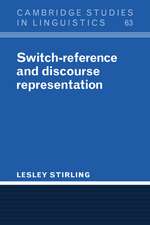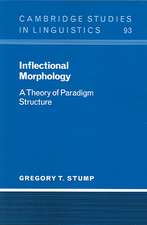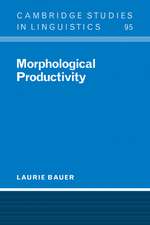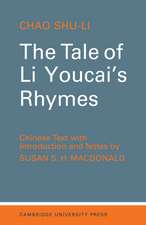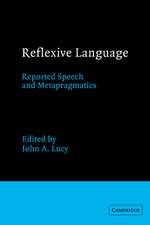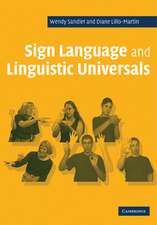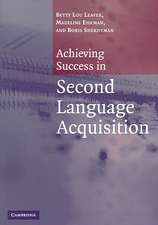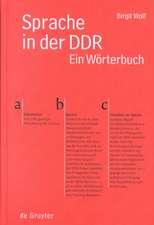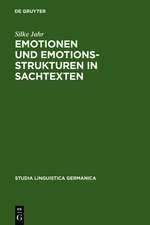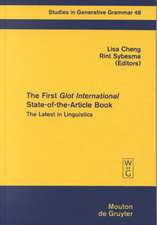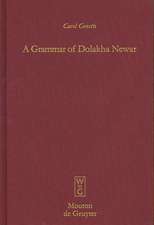How Languages Work: An Introduction to Language and Linguistics
Autor Carol Genettien Limba Engleză Hardback – 7 noi 2018
| Toate formatele și edițiile | Preț | Express |
|---|---|---|
| Paperback (1) | 463.84 lei 6-8 săpt. | |
| Cambridge University Press – 7 noi 2018 | 463.84 lei 6-8 săpt. | |
| Hardback (1) | 851.61 lei 6-8 săpt. | |
| Cambridge University Press – 7 noi 2018 | 851.61 lei 6-8 săpt. |
Preț: 851.61 lei
Preț vechi: 990.24 lei
-14% Nou
Puncte Express: 1277
Preț estimativ în valută:
162.97€ • 176.97$ • 136.90£
162.97€ • 176.97$ • 136.90£
Carte tipărită la comandă
Livrare economică 22 aprilie-06 mai
Preluare comenzi: 021 569.72.76
Specificații
ISBN-13: 9781108470148
ISBN-10: 1108470149
Pagini: 704
Dimensiuni: 193 x 252 x 35 mm
Greutate: 1.63 kg
Ediția:2Revizuită
Editura: Cambridge University Press
Colecția Cambridge University Press
Locul publicării:Cambridge, United Kingdom
ISBN-10: 1108470149
Pagini: 704
Dimensiuni: 193 x 252 x 35 mm
Greutate: 1.63 kg
Ediția:2Revizuită
Editura: Cambridge University Press
Colecția Cambridge University Press
Locul publicării:Cambridge, United Kingdom
Cuprins
List of figures; List of tables; Preface; Acknowledgements; List of glossing conventions; The book's approach; For students: how to use this book; Part I. Primary Chapters: 1. Introduction: language, languages, and linguistics Carol Genetti; 2. Phonetics: physical dimensions of speech sounds Matthew Gordon; 3. Phonology: organization of speech sounds Matthew Gordon; 4. Morphology: what's in a word? Marianne Mithun; 5. Word classes: evidence from grammatical behavior Carol Genetti; 6. Syntax: words in combination Carol Genetti; 7. Semantics: how language makes sense Michael Israel; 8. Pragmatics: inference for language Mira Ariel; 9. Discourse: language beyond the sentence Wallace Chafe; 10. Prosody: the music of language Wallace Chafe; 11. Language in the social world Mary Bucholtz and Lal Zimman; 12. Language change: the dynamicity of linguistic systems Marianne Mithun; 13. Language contact and areal linguistics Alexandra Y. Aikhenvald; 14. First language acquisition Patricia M. Clancy; 15. Second language acquisition Dorothy Chun and Jan Frodesen; Part II. Language Profiles: 1. Kabardian Matthew Gordon and Ayla Applebaum; 2. Goemai Birgit Hellwig; 3. Manange Kristine Hildebrandt; 4. Finnish Ritva Laury; 5. Nuuchahnulth (Nootka) Toshihide Nakayama; 6. South Conchucos Quechua Daniel J. Hintz; 7. Tsez Bernard Comrie; 8. Bardi Claire Bowern; 9. Lowland Chontal Loretta O'Connor; 10. Manambu Alexandra Y. Aikhenvald and Carol Genetti; 11. African-American English Anne H. Charity Hudley and Christine Mallinson; 12. Indonesian Robert Englebretson; 13. Seneca Wallace Chafe; 14. Akkadian Guy Deutscher; Glossary; References; Index; Appendix: IPA summary sheet.
Recenzii
'Genetti's and the contributing authors' careful consideration of and attention to the reader's needs make for a highly engaging and comprehensive revised volume which goes well beyond constituting just another introductory textbook in the field. The volume is most readable, providing a solid, up-to-date understanding in chapters which span the full scope of expected areas.' Martin Howard, University College, Cork
'This is an excellent text, novel in its approach to the study of language. It assumes no prior knowledge, provides a step-by-step guide to the building blocks of language, with up-to-date examples from across the globe. Other features of the text, such as the sidebars, stop-and-reflect boxes, wireless icons, and instructions for tutors and students alike, are like goodies in a toolbox for both the initiates and novices to this complex area of human communication.' Ayo Amuda, University of South Wales
'This impressive textbook comprises carefully dovetailed chapters by renowned linguists, combining introductions into numerous subfields with discussions of current controversies from a typological perspective. Both beginners and advanced students are catered for with a wide range of language profiles and exercises.' Florian Haas, Friedrich-Schiller-Universität Jena
'The biggest strength of this book is that it greatly improves students' analytical skills through an abundance of interesting data from a variety of languages.' Éva Kardos, University of Debrecen
'How Languages Work captures the joy of linguistics by immersing readers in data from an amazing array of languages. Innovative exercises use online resources to introduce the linguistic world outside the classroom.' Clifton L. Pye, University of Kansas
'… the book seems to cover its goals since each chapter of the first part explains explicitly the linguistic principles and structures and encourages students to apply methods in order to better perceive a linguistic phenomenon. Also, by reading the second part of the book, students will be able to observe different grammatical structures in different languages of the world and understand the linguistic diversity.' Georgios P. Georgiou, LINGUIST List
'This is an excellent text, novel in its approach to the study of language. It assumes no prior knowledge, provides a step-by-step guide to the building blocks of language, with up-to-date examples from across the globe. Other features of the text, such as the sidebars, stop-and-reflect boxes, wireless icons, and instructions for tutors and students alike, are like goodies in a toolbox for both the initiates and novices to this complex area of human communication.' Ayo Amuda, University of South Wales
'This impressive textbook comprises carefully dovetailed chapters by renowned linguists, combining introductions into numerous subfields with discussions of current controversies from a typological perspective. Both beginners and advanced students are catered for with a wide range of language profiles and exercises.' Florian Haas, Friedrich-Schiller-Universität Jena
'The biggest strength of this book is that it greatly improves students' analytical skills through an abundance of interesting data from a variety of languages.' Éva Kardos, University of Debrecen
'How Languages Work captures the joy of linguistics by immersing readers in data from an amazing array of languages. Innovative exercises use online resources to introduce the linguistic world outside the classroom.' Clifton L. Pye, University of Kansas
'… the book seems to cover its goals since each chapter of the first part explains explicitly the linguistic principles and structures and encourages students to apply methods in order to better perceive a linguistic phenomenon. Also, by reading the second part of the book, students will be able to observe different grammatical structures in different languages of the world and understand the linguistic diversity.' Georgios P. Georgiou, LINGUIST List
Notă biografică
Descriere
A fully revised introduction to language in use, containing in-depth language profiles, case studies, and online multimedia resources.


